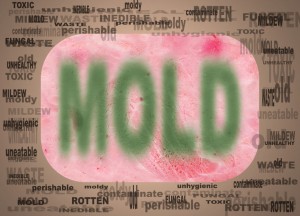All About Mold
Most of us have heard the warnings enough to be fittingly concerned about the presence of mold in our homes. Breathing in indoor mold — especially black or so-called “toxic” mold — has been shown to contribute to various respiratory tract symptoms and other health issues. And its presence is particularly worrisome when someone in your home is already suffering from respiratory issues like asthma.

Chimney leaks can deposit water in your ceilings and walls where mold can be devilishly hard to deal with. All it takes is one big rain.
But here’s something you might not have considered: It’s not just basements, attics and bathrooms that you need to be vigilant about when it comes to mold. Mold growth can also occur in and around your chimney. That’s part of why, as chimney professionals, Chim Cheree technicians spend so much time talking to our clients about doing what we can to prevent moisture intrusion, and keeping up with annual chimney inspections so we can be aware of any problems as soon as possible.
Detecting Mold – What’s That Smell?
If you’ve been noticing a pungent, musky odor coming from inside or around your chimney — something similar to what you smell in a damp basement — odds are you’re accumulating some mold growth.
Some homeowners notice discoloration — green, black or brown splotchy areas — in or around their chimney, which tips them to a potential mold problem. But more often than not, the nose knows first.
If you suspect that you have a mold problem, call Chim Cheree — our technicians can tell you for certain what you’re dealing with, and recommend the right solutions.
Removing Mold – Carefully and Cautiously
Being around mold can be dangerous It’s not recommended that you take on mold remediation yourself if you’re dealing with a mold-covered area larger than 10 square feet (about a 3 foot by 3 foot space). In that case, pros from the Environmental Protection Agency and on and on urge homeowners to bring in professionals who are trained to safely work with and thoroughly remediate mold.
Our CSIA-certified technicians are not only trained to handle mold remediation, but to properly correct the chimney problems that led to your mold in the first place.
Mold Isn’t Your Core Problem – It’s a Symptom
As troubling as mold growth is, the truth of the matter is that your chimney mold problem is just an outgrowth of your real issue: moisture intrusion. Mold needs moisture to feed on, so mold’s presence in your chimney system means excess moisture is getting in consistently.
Your chimney leak can be traced back to a variety of problems — you might have a cracked chimney crown, damaged flashing, receded or deteriorating masonry joints or many other issues. Chim Cheree technicians can carefully inspect your system, looking closely at all the common (and less common) problem areas for chimney leaks, locate the source (or sources) of your leak and make the necessary fixes to keep water out. With the mold properly removed and the leak expertly repaired, that smelly, dangerous problem will be out of your life.
If you have any questions or concerns about chimney mold — or want to schedule an appointment with our CSIA-certified technicians — just give Chim Cheree a call!
